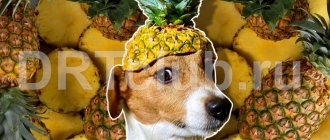When feeding naturally, the intake of nutrients should be regulated by selecting the diet. When consuming ready-made industrial food, it is better not to use vitamins for your German Shepherd, since such canned food is usually completely balanced.
Important! Vitamins can be given to a puppy only after examination by a veterinarian and passing the appropriate tests.
You cannot use vitamins for German Shepherd puppies just like that, because it is winter or the pet is growing quickly. There must be serious reasons for giving these substances. An exception may be poor nutrition, when it is not possible to feed the puppy with meat by-products or ready-made food.
Essential vitamins
In total, more than 30 types of vitamins are produced for German shepherds, but the most important are groups A, B, C, D, E. Their deficiency is detected most often and leads to serious illnesses; their absence has a particularly serious impact on puppies weaned from their mother at 2 months and under.
Vitamin A (carotene)
The body needs it at any age. First of all, it is needed for normal vision, since carotene is part of the retina. With vitamin deficiency, growth retardation, inflammation of the eyes and other mucous membranes, and bronchitis are observed. A clear sign is dryness of the eyeball.
B vitamins
This is a whole range of substances. A puppy needs all these vitamins, since each of them has its own unique meaning:
- B1 (thiamine). Responsible for the conduction of nerve impulses and muscle contraction. Deficiency leads to polyneuritis, convulsions, and paralysis.
- B2 (riboflavin). Deficiency leads to hair loss on the back, dermatitis, clouding of the whites of the eyes, muscle weakness and cuts.
- B5 (pantothenic acid). Responsible for metabolism in hair follicles. In its absence, the puppy’s hair turns gray and falls out.
- B6 (pyridoxine). The vitamin regulates the creation of proteins, so its deficiency leads to growth retardation, anemia, and systemic inflammatory phenomena.
- B12 (cyanocobalamin). Responsible for hematopoiesis. Deficiency leads to lethargy, pallor, severe thirst, and impaired bowel movements and urination.
- BC (folic acid). Due to deficiency, anemia, leukopenia occurs, thinness, stunting, dandruff and dry skin are observed.
Vitamin C (ascorbic acid)
It is an activator of almost all enzymes. Ascorbic acid is responsible for the body's immune response and hematopoiesis. A deficiency within 2 months leads to a severe decrease in immunity, scurvy, and anemia.
Vitamin D (calciferol)
Responsible for the absorption of calcium and phosphorus, it is beneficial for bones and joints. In its absence, these trace elements are washed out from the skeleton, causing it to become soft and lose strength. As a result, the bones become bent over 1-2 years, the structure of the joints is disrupted, and arthrosis occurs.
Vitamin E (tocopherol)
It must be included in the diet for puberty. In the absence of tocopherol for 6 months or more, infertility occurs. With vitamin E deficiency, complications develop in a pregnant bitch. The central nervous system is also affected, causing paresis and paralysis.
pharmachologic effect
The vitamin complex helps to harmoniously cope with the menopause period. At this point, women face some adverse consequences:
- disorders of fat metabolism;
- excess weight with the same diet;
- profuse sweating;
- metabolic disorders
- depressive states;
- mood swings, irritability;
- problems falling asleep, insomnia;
- changes in bone and cartilage tissue.
Due to its rich chemical composition, the drug has a complex effect on the body:
- Vitamins take part in all vital processes and support the functioning of the immune system.
- Biotin provides an attractive appearance to nails and hair and prevents their loss. Useful during pregnancy and lactation.
- Folic acid stimulates the production of red blood cells, which carry oxygen to all tissues. It supports the normal functioning of nerve cells, heart and blood vessels, and also helps prevent skin aging processes and ensures attractive hair.
- Selenium prevents premature aging, eliminates imbalances in the synthesis of female sex hormones, and helps maintain skin elasticity.
- Zinc ensures normal vision, prevents myopia, and takes part in the functioning of the nervous system.
- Omega-3 fatty acids stimulate brain activity, ensure normal performance, and stabilize mood during menopause.
- Omega-6 fatty acids strengthen the immune system and prevent memory loss, inflammation, and cleanse the body of excess “bad” cholesterol.
Vitamin content
Products of animal and plant origin do not contain vitamins for a shepherd in equal quantities.
Vitamin A (carotene)
Carotene is a plant pigment and is found in red root vegetables (carrots, beets) and vegetables (tomatoes). A large amount of it can be found in egg yolk. However, exactly how much depends greatly on the feeding of the bird and the time of year. For puppies, the main source will be milk and butter, but the concentration in these products varies significantly.
B vitamins
The concentration of each B vitamin varies in different foods:
- B1 (thiamine). Contained in cereals, legumes, root vegetables. For dogs, liver, kidneys, and heart are more suitable as a source;
- B2 (riboflavin). The same meat by-products are rich in it;
- B5 (pantothenic acid). Found in rice, liver, egg yolk, potatoes;
- B6 (pyridoxine). Found in liver, eggs, spinach;
- B12 (cyanocobalamin). They are rich in dairy products and eggs, as well as beef liver and kidneys;
- BC (folic acid). Found in green leaves, cabbage, lettuce, spinach. There is a lot of it in the kidneys and liver.
Vitamin C (ascorbic acid)
It is found in large quantities in berries, red vegetables and fruits. For dogs, the liver, pituitary gland, adrenal glands, and eye lenses are more suitable sources. Puppies 4 months and younger can be given milk; it contains ascorbic acid, but in small concentrations.
Vitamin D (calciferol)
It is found in large quantities in the liver of fish. However, the main source is ultraviolet rays, since vitamin D is synthesized in the skin of the animal independently, but under the influence of sunlight.
Vitamin E (tocopherol)
The source is plants; there is very little of it in animal products. For adult pets, vegetables are the best option, but puppies 3 months and younger are sometimes capricious. If the dog is not yet accustomed to these products, then some amount of tocopherol can be extracted from the liver, albeit a little.
Do I need to get vaccinated at this age?
The only vaccination that should be done after three months is against rabies. All other vaccinations are distributed throughout the dog’s life so that nothing serious occurs at this age .
Vaccinations have either already been done or the deadline for them has not yet come.
But sometimes it happens that the puppy’s second vaccination falls at three months. It depends on the age at which the first one was performed.
Treatment with vitamins
Vitamin B2 can be used to speed up metabolic processes, wound healing, and treat inflammation of the mucous membranes. Nicotinic acid is used to eliminate dry skin, enteritis and colitis, to alleviate the symptoms of canine distemper in the later stages. Vitamin B12 is used to treat liver damage and maintain hematopoiesis.
vitamin seeds
Calciferol should be given to German Shepherd puppies to treat rickets. But it is administered only in combination with calcium and phosphorus. Ascorbic acid is used for infectious diseases; it is also effective for scurvy and anemia. Vitamin E is used to mitigate or eliminate postpartum complications.
Vitamins A, C, E have a positive effect on sulfur metabolism in the skin and hair growth. Pantothenic acid stimulates hair growth and prevents early greying. And vitamins A, C, B12, B2 will help get rid of dandruff.
Feeding dry food
How to choose?
When choosing food, immediately exclude all cheap ones. They will not be able to provide the puppy with all the vitamins and nutrients necessary for growth and development. Very often, abuse of such feeds leads to diseases in animals. The kidneys, liver and stomach suffer.
IMPORTANT!
You need to buy premium or super-premium food. They are not cheap, but they will help save a lot of time and will not harm the dog’s health.
If there is a lack of calcium, the puppy's ears begin to fall off..
Popular manufacturers:
- Acana;
- GO Natural;
- Grandorf;
- Orijen;
- Dukes Farm;
- Bosh;
- Eukanuba;
- Arden Grange.
How often to feed
Feeding your dog, as with natural food, is 4 times a day..
It is advisable to do this after a walk. Then let the puppy rest for several hours so that the food is digested.
How to Give Calcium to a German Shepherd Puppy
You need to remember the main rule - calcium for a German Shepherd puppy is always used together with phosphorus. If you give calcium at normal phosphorus levels, then calcium begins to be washed out of the bones and rickets develops. The ratio of calcium to phosphorus should be 1:1 or 2:1; a combination of 3:1 is already dangerous and leads to rickets.
This can be solved by giving calcium glycerophosphate, which contains both microelements.
Reasons are also needed for giving calcium supplements, since an excess of it in the diet leads to hypercalcemia. Which is accompanied by lack of appetite, severe thirst, colic and constipation, nausea and vomiting. As a result, brain disorders, polyuria, and increased coagulation develop.
What is better – natural or dry food?
Every owner thinks about which food is best for a pet. The debate over natural food and dry food never subsides.
Each of these foods can meet the needs of the puppy, the main thing is to follow the most important instructions in feeding the dog:
- When choosing dry food, opt for premium or super-premium class;
- Try to choose food for your breed;
- The food must be suitable for the dog’s age;
- If you choose natural food, the dog’s diet should be balanced;
- Natural food will require special vitamins;
- You must approach the choice of products responsibly: buy only fresh ones, exclude those that will harm the dog.
Expert opinion
Kozhevin Semyon Kirillovich
Expert dog handler.
“Food for a puppy of this breed is a very important matter. I know that many owners who are professional breeders choose natural food, believing that it is healthier for the dog. But they have enough time to cook and buy all the necessary products. People who get a German Shepherd “for the soul, and not “for business”, prefer dry food. If the dog's nutrition is correct, then no matter what type of food you choose, the dog will be happy."
Vitamin supplements for dogs
There are many vitamin complexes on the domestic market. Below are the best price-quality options for what vitamins to give your puppy:
- "Top 10 for dogs";
Available in tablet form, it contains a huge amount of vitamins and microelements. The most important are vitamins A, D, E, as well as all B vitamins. The composition contains calcium, phosphorus, potassium, sodium, iodine and other trace elements. Used for many diseases. Dosage for adult dogs – 1 tablet, for puppies – half a tablet.
- "Tetravit";
The drug is named so because of the complex of vitamins A, D, E and F, which are found in the oily liquid. Available in solutions for oral use and in injection form. The product is used for pets with low resistance, exhaustion, during and after illness. Dogs are administered intramuscularly or subcutaneously 0.2-1 ml.
- "8 in 1 Excel Deter";
The drug is intended to wean dogs and puppies from eating feces and other foreign objects. Contains a number of vital acids and vitamins (B1, B2, B6). Small dogs up to 10 kg of weight are given 1 tablet per 3.5 kg of weight, large pets - a tablet per 7 kg. The drug is fed with food.
- "Laveta Super for dogs";
Contains a complex of carotene, calciferol, tocopherol and B vitamins. The solution is given orally. The dosage for pets up to 10 kg is 1 drop per 1.5 kg, and for large animals - a drop per kilogram. Before use, the product can be mixed with water.
- "SA-37";
Contains almost the entire list of useful substances. The composition includes completely group B, as well as vitamins A, C, D, E, K. In addition, there is calcium, phosphorus, potassium, iodine and other mineral supplements, antioxidants and proteins. Puppies are given 1-4 g/kg, and adult pets – 1-2 g/kg.
- "Farmavit Neo for dogs."
A group of drugs that includes complexes for puppies, adult animals and pregnant bitches. The composition includes all necessary vitamins and microelements. The dosage of the drug SK for an adult German shepherd is 3 kg tablet, the drug SK-BK for pregnant bitches is 1-2 tablets. per 3 kg, and for lactating women – 2-4 tablets. per 3 kg, puppies are given SK-M in the amount of 1 tablet. by 2 kg.
Precautions and contraindications
Dog handlers and veterinarians say that there is no need to constantly give the same drug. They should be changed every season. Problems with deficiencies and excesses of nutrients in the body can be avoided if you strictly follow the instructions on the package.
As a rule, vitamin complexes for dogs have no contraindications, but you should refrain from using them in the following cases:
- allergy;
- signs of overdose;
- individual intolerance.
At the first symptoms of an excess of the drug, you should contact a veterinarian, and not wait until your pet’s health condition gets worse.
Prohibited Products
In terms of food, shepherds are unpretentious dogs, but some foods can be dangerous to their health.
- Sugar, sweets, raisins and grapes. Sweets, cookies, chocolate and other sugar-containing treats damage teeth and cause obesity and diabetes.
- Milk – causes diarrhea and interferes with calcium absorption.
- Raw fish can cause infections and parasites.
- Mayonnaise, ketchup, mustard, vinegar, etc.
- Fried foods can lead to obesity.
- Citrus fruits are often the cause of allergies.
- Plums and peaches cause indigestion.
- Avocado. Many animals like its taste. But this source of healthy fats can be harmful to your pet's health. Persin is a toxin, a few grams of which cause stomach upset and vomiting.
- Walnuts and almonds. Dogs are unable to digest nuts (with the exception of pine nuts and peanuts). In addition, almonds contain toxic acid that can cause acute poisoning.
Breed characteristics
Breed characteristics leave an imprint on raising puppies. The type of food depends on the size of the dog, its working qualities and many other aspects of physiology, purpose and lifestyle.
All dogs are genetically carnivores, but an active life and constant movement requires compensation for energy costs in the form of high-protein diets. Puppies grow disproportionately, and often the rapidly increasing body weight “puts pressure” on the fragile skeleton, as a result of which puppies begin to have problems with the musculoskeletal system.
Remember! It is not difficult to spoil a dog by turning it into a disabled person: physical activity that is inappropriate for its age and an unbalanced diet will quickly do their job.
Any type of nutrition requires a regimen, a competent approach to diet planning, and careful attention to your pet.











